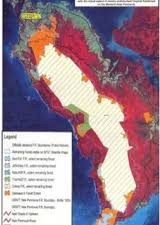By Sulaiman Aruna Sesay
Freetown, the capital city of Sierra Leone, has always been known for its susceptibility to flooding. As we are in the rainy season, the risks of flooding have intensified, especially for residents living in the city’s red zones.
Red zones are areas labelled by the Government of Sierra Leone as high-risk zones, prone to flooding and landslides due to heavy rains and climate change effects. Unfortunately, these zones are also occupied by many low-income residents who cannot afford to live in safer areas.
As the rainy season progresses, residents living in Freetown’s red zones face the real threat of another flood disaster, just like the August 17 Mudslide that claimed over one thousand lives in 2017. Studies have shown that Freetown’s geology, in addition to heavy rainfall, makes it highly susceptible to flooding. Furthermore, the city’s poor drainage system contributes significantly to the problem.
The recent rains have already begun to show their impact on communities across the red zones as many areas have experienced flooding, resulting in destroyed properties, and loss of lives. The situation is dire and calls for immediate action from the government and other relevant stakeholders.
One of the fundamental steps that can be taken to address the problem is the proper management of waste and regular clearing of drains. Blockages of drains in Freetown’s red zones could lead to significant flooding, which could cause extensive damage to properties and displacement of residents.
The Government of Sierra Leone and stakeholders should, therefore, prioritize cleaning the city’s drains and channels to prevent blockages and improve water flow. There should also be the installation of proper drainage systems in flood-prone areas to reduce the risks of flooding.
Furthermore, there should be an evacuation plan in place to relocate residents of affected areas before disasters occur. Evacuation planning will help in saving lives and properties during floods by providing rescue and relief services to those in need.
The media also has a critical role to play in sensitizing and educating residents living in the city’s red zones on best practices in flood prevention and survival. The media can provide information on how to stay safe during floods and how to take precautions before a flood disaster occurs.
The risks of flooding in Freetown’s red zones have intensified, and immediate action must be taken to prevent another disaster. Proper drainage management, evacuation planning, installation of proper drainage systems, and education and sensitization of residents are some of the interventions needed to reduce the risks of flooding in the city. It is high time for the government and stakeholders to take proactive and concrete steps to ensure the safety of residents living in Freetown’s red zones.













